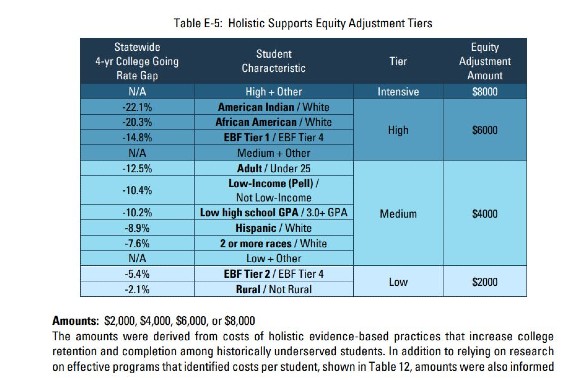Plan also includes added funds for students with low GPA, adult learners
Illinois soon could give bonuses to universities for enrolling African American and Hispanic students under a proposal by a state government commission.
The recommendation by the Illinois Commission on Equitable Public University Funding aims to address “the historic inequities” in education “especially among students from low-income households, students of color, students from rural communities, and working adults,” according to a news release.
But some higher education advocates say the proposal, if adopted, may be unconstitutional.
As part of a new education funding formula, the commission report recommends the Illinois Legislature give bonuses, or “equity adjustment amounts,” to universities to “incentivize and support activities that increase the retention and completion of historically underserved student groups.”
Commission co-chair Pranav Kothari stated in the news release the funding model is “grounded in equity” to ensure “institutions receive funds needed to support the diverse needs of their student bodies and remove barriers to student access and success.”
The proposal recommends universities receive an extra $6,000 for each African American and American Indian student, $4,000 for each Hispanic student and each student of two or more races, and $2,000 for each rural student.

IMAGE: Illinois Commission on Equitable Public University Funding report
It also includes additional money for students of low income, adult learners, and those with low high school GPAs.
“The Commission worked deliberately and collaboratively to submit recommendations aligned with the statutory charge on a new funding formula to the Illinois General Assembly,” the Illinois Board of Higher Education stated in an emailed statement provided to The College Fix by spokesperson José García.
Commission leaders “look forward to working with legislators as they evaluate the Commission’s report and advance efforts that adequately, equitably and stably funds the state’s public universities,” the board stated.
The commission is made up of 33 members, including state lawmakers, public university employees, students, and representatives of education advocacy organizations.
García did not answer The Fix’s questions about what the commission believes will be gained from instituting the new funding formula and how it would respond to the legal concerns about funding based on race.
MORE: Western Illinois U. ‘Day of Racial Healing’ includes ‘Racism for White People’ event
Paul Vallas, policy adviser at the Illinois Policy Institute, a nonpartisan research organization, told The Fix in a recent email the proposal may be unconstitutional. Vallas, a Democrat, is a former CEO of Chicago Public Schools and former budget director for Chicago Mayor Richard Daley.
“Given the Supreme Court issued a decision declaring university enrollment based on race is unconstitutional, I would believe that providing supplemental public support to universities based on race may also be unconstitutional,” he said.
Vallas told The Fix: “The Supreme Court was clear, though, that socio-economic factors such as income can be considered in deciding enrollment, which would help achieve a similar objective for those most in need.”
Jonathan Butcher, a senior research fellow at The Heritage Foundation, expressed similar concerns in an email to The Fix last week.
“These changes appear to be in clear violation of state and federal civil rights laws,” Butcher said. “The U.S. Supreme Court decided last year in the Students for Fair Admissions cases that the use of racial preferences in college admissions was unconstitutional. Yet this proposal from Illinois seems to be based on racial preferences.”
Butcher said the funding proposal is counter to federal laws, including the Civil Rights Act of 1964.
“Students, parents, taxpayers, and lawmakers should be furious that these officials are planning to treat students differently based on race,” he told The Fix.
Vallas at the Illinois Policy Institute said the commission’s proposal does not solve the real problem in higher education: “the lack of quality school choices at the K-12 level.”
As a result, he told The Fix students are “unprepared for higher education and more likely to drop out. Those most at risk are poor families, which are disproportionately Black and Latino.”
The Fix also contacted Illinois House Republican Leader Tony McCombie and Senate Republican Leader John Curran twice within the past two weeks, asking for their opinions of the proposal and higher education reform in the state. Neither responded.
Illinois public colleges and universities are required to develop and implement equity plans and practices under House Bill 5464, signed by Gov. J. B. Pritzker in 2022.
MORE: University of Illinois grant funds DEI virtual reality training for nurses
IMAGE: Raw Pixel/Shutterstock
Like The College Fix on Facebook / Follow us on Twitter






Please join the conversation about our stories on Facebook, Twitter, Instagram, Reddit, MeWe, Rumble, Gab, Minds and Gettr.